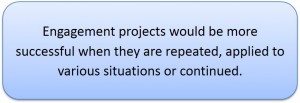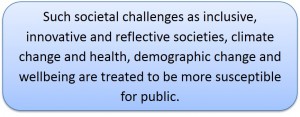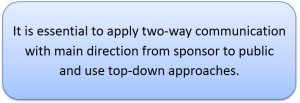Currently, we are finalising the report related to enhancing and hindering factors for public engagement (PE) combining dynamically governed research policy cycle and participatory performance model. Within the frame of literature review and survey analysis, we identified driving forces and barriers to get people engaged in science and research policy.
As a result, we collected a list of core enhancing factors for successful PE, which is related to quality of governance and research, better interaction and communication: 1) transparency; 2) balanced inclusion; and 3) improvement of policies (effectiveness & responsiveness). Moreover, PE is more successful when it is repeated, i.e. it helps to reorient public towards self-organisation and create overall dynamics. Despite promising keywords for the success of PE, inevitably, we are faced with barriers such as passivity and fatigue of lay people to get engaged.
We identified a myriad of these barriers: different attitudes in diverse cultures and contexts, scarce education before consultation on PE, mistrust because of former experience, memories of generations, lack of networks, uncertain impact of PE (it is hard to many lay people understand the point of the PE exercise and the technology related), then democratic deficit that is related to procedures to channel public opinion into the national democratic procedures, national culture of public debate and so on. Taking these issues in consideration, it is obvious that making decisions without public support results in a multiple practical difficulties among politicians, scientists, researchers and lay people.
The report on enhance and hinder factors for PE will be published soon on the website. Just follow our news.
-Loreta & Saulė-


